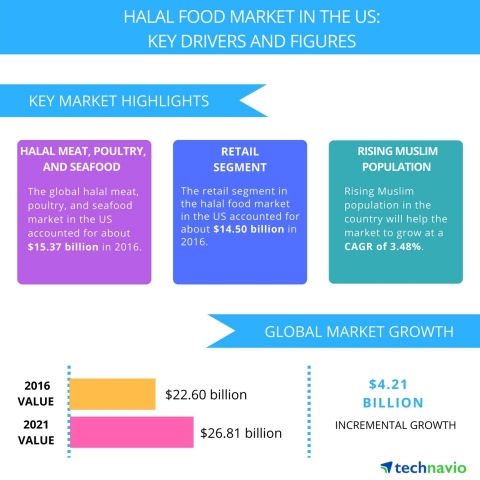LONDON--(BUSINESS WIRE)--Technavio market research analysts forecast the halal food market in the US to grow at a CAGR of more than 3% during the forecast period, according to their latest report.
The market study covers the present scenario and growth prospects of the halal food market in the US market for 2017-2021. The report also lists retail and food service as the two major end-user segments, of which the retail segment accounted for more than 64% of the market share in 2016.
This report is available at a USD 1,000 discount for a limited time only: View market snapshot before purchasing
Buy 1 Technavio report and get the second for 50% off. Buy 2 Technavio reports and get the third for free.
Technavio analysts highlight the following three market drivers that are contributing to the growth of the halal food market in the US:
- Symbol of healthy food
- Increasing sales through retail channels
- Rising Muslim population in the country
Looking for more information on this market? Request a free sample report
Technavio’s sample reports are free of charge and contain multiple sections of the report including the market size and forecast, drivers, challenges, trends, and more.
Symbol of healthy food
Since halal animals are slaughtered, processed, and prepared according to strict Islamic dietary laws, these foods are considered healthy and hygienic when compared to non-halal meat. The market for halal foods is growing rapidly which indicates the inclination of other community consumers toward halal foods. Thus, there is quite a huge opportunity for halal companies to even consider non-Muslims population as their target consumers.
According to Manjunath Reddy, a lead analyst at Technavio for food research, “The health benefits associated with halal is the main factor that is promoting the acceptance and demand for halal food among non-Muslims. Halal label on the food and stores clearly indicates that the food is prepared in a hygienic and clean manner in a healthy environment and is thus safe to be consumed.
Apart from this, there has been a rise in the number of restaurants and food chains adopting the halal label in the past few years. Many cities have more than 100 halal restaurants in the US, with the highest number of halal restaurants in California in 2017. Thus, there is a high demand for halal foods among people of almost every community.
Increasing sales through retail channels
The sales and distribution of products in the US happen primarily through organized and modern retail channels. Globally, the sale of halal food is mainly dominated by wet and traditional markets. But in the US, the sale of halal food is through modern retail channels like supermarkets, hypermarkets, convenience stores, and more. With growing demand for halal foods, more number of retailers are selling halal labeled food products. It is mandatory for the supermarkets and other retailers who supply halal food, to clearly label halal.
In 2016, more than 7500 places sold halal food the US as compared to nearly 200 places in 1998. These stores have a dedicated space for halal foods and are kept separately from non-halal foods. Thus, most consumers trust this source of distribution for halal meat products.
“Supermarkets like Tesco, J Sainsbury, Walmart, Mark and Spencer, Co-operative Group, and others sell halal food including halal confectionery, meat, snacks, bread, cereals, and others. Other stores like Kroger, sell halal food only at places where there is high demand for it. Halal food was ranked as one of the highest growing segments in Whole Foods Market in 2016,” says Manjunath.
Rising Muslim population in the country
Though Muslims constitute a very small portion of the total US population, it is the third most followed religion in the country. The rate at which Muslim population is growing is much higher than the rate at which other non-Christian communities are growing. In 2015, Jews were the highest non-Christian population present in the country. This is followed by Muslim. About more than 3.1 million Muslims were present in the US in 2015, and their population is expected to rise to more than 8 million by 2050. This would make them the highest non-Christian community in the US by 2050. The major portion of the population belongs to Muslim immigrants. High birth rate, rise in Muslim immigrants, relatively younger population are some of the main reasons that are increasing the population of Muslims in the country. Thus, the rise in Muslim population will surely drive the sales of halal food during the forecast period.
Browse Related Reports:
- Spices and Seasoning Market in the US 2017-2021
- Global Lactose-free Cheese Market 2017-2021
- Global Dietary Supplements Market 2017-2021
About Technavio
Technavio is a leading global technology research and advisory company. Their research and analysis focuses on emerging market trends and provides actionable insights to help businesses identify market opportunities and develop effective strategies to optimize their market positions.
With over 500 specialized analysts, Technavio’s report library consists of more than 10,000 reports and counting, covering 800 technologies, spanning across 50 countries. Their client base consists of enterprises of all sizes, including more than 100 Fortune 500 companies. This growing client base relies on Technavio’s comprehensive coverage, extensive research, and actionable market insights to identify opportunities in existing and potential markets and assess their competitive positions within changing market scenarios.
If you are interested in more information, please contact our media team at media@technavio.com.




